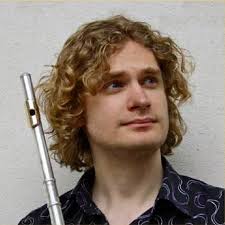The Mote Hall, Maidstone, 31 January 2015
Flautist Harry Winstanley may have been introduced as local boy makes good but there is nothing remotely domestic about his international reputation or his technical prowess. Nor is he limited to performing. The first half of the concert was built around two substantial and challenging works for flute and orchestra, the first of which, Paul Taffanel’s Fantasy on themes from Weber’s Der Freischutz had been orchestrated for this performance by Harry Winstanley himself. It is a sensitive arrangement, thinning out Weber’s orchestra so as not to overwhelm the soloist but retaining just enough brass to allow significant impact in climaxes. The work opens with Agathe’s Leise, leise fromme Weise and wends its way through to Annchen’s Einst träumte meiner. On the way the flautist indulges in increasingly elaborate ornamentation like a Bel-canto Diva on a benefit evening. It was intoxicating and hugely enjoyable. Prior to this we had heard the overture to Der Freischutz where the horns had excelled themselves though the piece never really caught fire.
Carl Nielsen’s Flute Concerto is equally demanding of the soloist and makes even more demands of the audience. There is a constant tension between the soloist and the orchestra which changes moment to moment in emotional intensity and melodic invention. At one time the flautist seems to be trying to calm the orchestra whereas at others they seem to be forcing him to go into areas his gentle, almost naïve musical line clearly does not want to pursue. The introduction of the snarling trombone at the end leaves us with a lurking doubt as to just how seriously we should take the work. Maybe we should just sit back and enjoy it and not worry about the journey?
After the interval we were in much safer territory with Dvorak’s sixth symphony. The influence of Brahms is obvious throughout but this is Brahms with a smile on his face and the Czech folk influence is never far from the surface. The brass are very exposed but proved themselves more than worthy of the challenge with ringing fanfares at both ends of the work. There is a gentle optimism in the slow movement which was supported by rich string playing and occasional darker moments passed quickly as the woodwind bring back the sunshine. The scherzo was furiously driven like a whirling folk dance throughout and brought us to the melodic delights of the finale, Brian Wright maintaining a lightness and sense of joy throughout.
The next concert on 21 March brings us the Elgar Violin Concerto with a change of soloist. Bartosz Woroch returns to play for us in place of Ulf Hoelscher.

